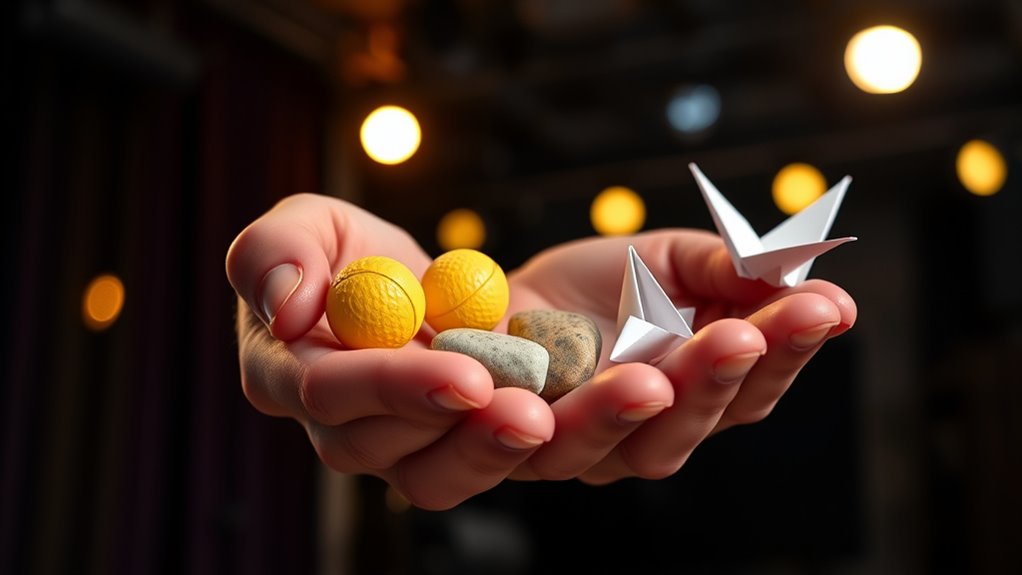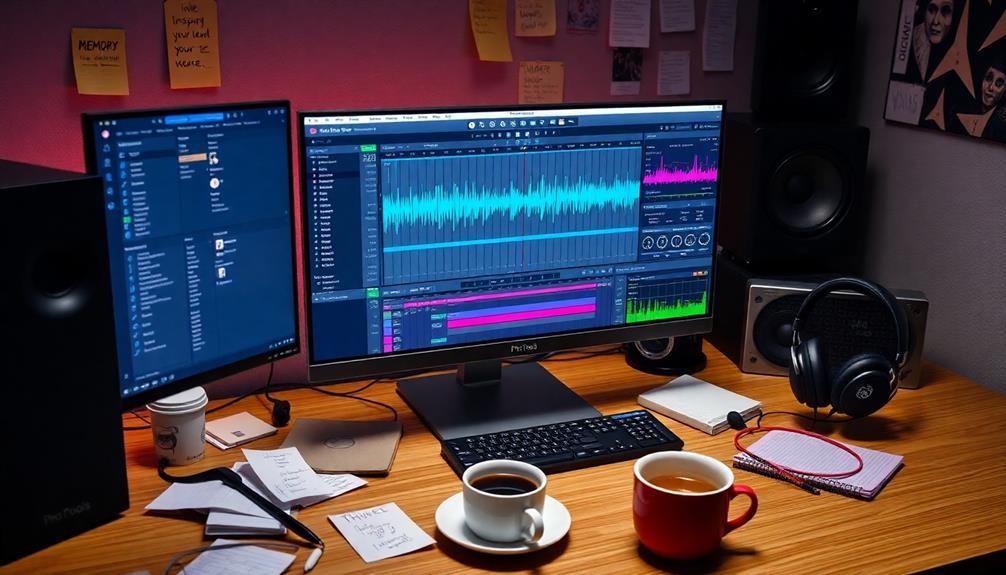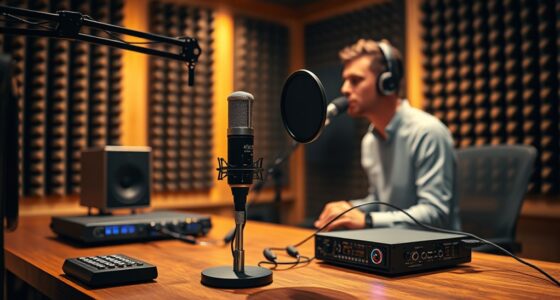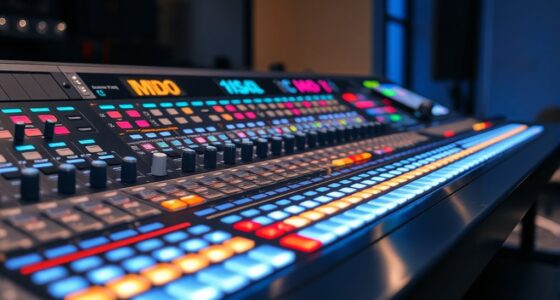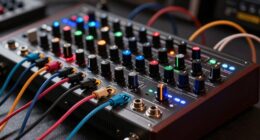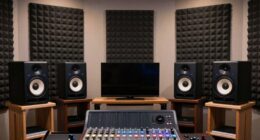To manage stage anxiety, try grounding techniques like focusing on your breath, bodily sensations, or sounds around you to stay present. Incorporate deep breathing exercises—inhale for four counts and exhale for six—to calm your nerves both backstage and before stepping on stage. Regular practice builds resilience, helping you respond calmly to nerves over time. Exploring digital tools and apps can enhance your approach. Keep exploring further, and you’ll discover even more ways to boost your confidence.
Key Takeaways
- Mindfulness techniques help performers stay present, reducing anxious thoughts and promoting calmness before stage performances.
- Deep breathing exercises slow the heart rate and relax muscles, effectively managing acute anxiety symptoms backstage or in waiting areas.
- Integrating consistent mindfulness and breathing routines builds resilience and confidence over time for better stage anxiety management.
- Digital apps and AI tools offer guided exercises and real-time feedback, enhancing personalized anxiety coping strategies.
- Combining these mental tools fosters a sense of control, reduces overwhelm, and prepares performers to approach stages with confidence.

Stage anxiety can feel overwhelming, but there are effective tools to help you manage it confidently. One of the most powerful methods involves using mindfulness techniques. When you’re about to step onto the stage, your mind may race with worries about mistakes, judgment, or forgetting lines. Practicing mindfulness helps ground you in the present moment, reducing those anxious thoughts. To do this, focus on your breath, sensations in your body, or the sounds around you. For example, take a moment to notice how your feet feel against the ground or the texture of your costume. This active awareness pulls you out of a spiral of negative thinking and helps you stay centered.
Breathing exercises are another essential tool in your anxiety management arsenal. When nerves kick in, your breathing often becomes shallow and rapid, which can intensify feelings of panic. By intentionally slowing and deepening your breath, you send a calming signal to your nervous system. Try inhaling slowly for a count of four, holding for a second, then exhaling for a count of six. Repeat this several times until you notice your heart rate slowing and your muscles relaxing. This simple technique can be done quietly backstage or even while waiting in the wings. It’s a quick reset that can make a significant difference in how you feel when it’s your time to perform.
Integrating mindfulness and breathing exercises into your routine before stepping on stage can build resilience over time. As you practice regularly, you’ll become more familiar with your anxiety triggers and develop the ability to respond calmly rather than react impulsively. This proactive approach doesn’t mean you’ll eliminate stage fright altogether, but it gives you the tools to manage it effectively. Over time, you’ll notice that you can enter performances with a clearer mind and a greater sense of control. Additionally, advancements in AI’s impact on mental health suggest that digital tools and apps can support your mindfulness practice, providing guided exercises and real-time feedback to help manage anxiety more effectively.
Frequently Asked Questions
Can Stage Anxiety Affect Physical Health Long-Term?
Yes, stage anxiety can affect your long-term health if left unmanaged. Chronic anxiety may lead to issues like high blood pressure, weakened immune function, and sleep problems. By practicing effective anxiety management techniques, you can reduce these risks and protect your overall health. Staying proactive about managing your stress helps prevent lasting physical effects and keeps you healthier and more confident during performances.
Are There Specific Tools for Digital or Virtual Performances?
Research shows that over 80% of performers feel more confident with digital strategies. For virtual performances, you can use virtual tools like teleprompters, screen sharing, and real-time chat to stay engaged. These tools help reduce anxiety by providing structure and interaction, making you feel more prepared. Incorporate digital strategies like rehearsing with tech setups or using visual cues to boost your confidence and deliver a seamless virtual performance.
How Do Cultural Differences Impact Stage Anxiety?
Cultural perceptions and performance expectations greatly influence your stage anxiety. In some cultures, public performance is highly valued, which might increase your pressure and nervousness. Conversely, cultures with relaxed attitudes toward performance can help you feel more comfortable. To manage this, understand your cultural background and expectations, then develop coping strategies like deep breathing or visualization, tailored to your cultural context, to reduce anxiety and boost confidence on stage.
Can Diet Influence Performance Anxiety Levels?
Think of your body as a finely-tuned instrument; your diet impact can make it sing or squeak. Eating balanced, nutritious foods with proper nutrition strategies helps stabilize blood sugar and reduce jitters. Avoid caffeine and heavy meals before performing, as they can amplify anxiety. By fueling your body wisely, you create a calm, steady foundation that boosts confidence and keeps stage fright at bay, letting your true talent shine through.
Are There Age-Specific Strategies for Young Performers?
Yes, there are age-specific strategies for young performers. For youth performance, you should focus on age-appropriate techniques that build confidence and reduce anxiety. Encourage practices like simple breathing exercises, visualization, and positive self-talk tailored to their developmental level. Creating a supportive environment helps them manage stage fright effectively. Remember, engaging in fun, age-appropriate activities fosters a sense of accomplishment and eases performance-related nerves.
Conclusion
With these stage anxiety tools, you’ll conquer your fears faster than a rocket blasting into space. Remember, your nerves are just tiny flames that you can easily control, turning into a brilliant performance. Embrace these techniques, and you’ll transform from a trembling performer into a confident star shining brighter than the sun. Don’t let anxiety steal your moment—grab these tools and own the stage like the unstoppable superstar you are destined to be!

